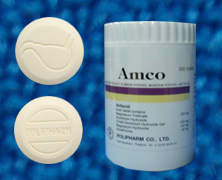Aluminium hydroxide
 Aluminium hydroxide, Al(OH)3, is the most stable form of aluminium in normal conditions. It is found in nature as the mineral gibbsite (also known as hydrargillite).
Aluminium hydroxide, Al(OH)3, is the most stable form of aluminium in normal conditions. It is found in nature as the mineral gibbsite (also known as hydrargillite).Closely related are aluminium oxide hydroxide, AlO(OH), and aluminium oxide, Al2O3, differing only by loss of water. These compounds together are the major components of the aluminium ore bauxite.
Chemistry
Gibbsite has a typical metal hydroxide structure with hydrogen bonds. It is built up of double layers of hydroxyl groups with aluminum ions occupying two-thirds of the octahedral holes between the two layers.
Aluminum hydroxide is amphoteric. It dissolves in acid, forming Al(H2O)63+ or its hydrolysis products. It also dissolves in strong alkali, forming Al(OH)4-.
Aluminum hydroxide is produced in the Bayer process as an intermediate in the production of aluminum metal.
Pharmacology
Pharmacologically, this compound is used as an antacid under names such as Alu-Cap, Aludrox or Pepsamar. The hydroxide reacts with excess acid in the stomach, reducing its acidity. This decrease of acidity of the contents of the stomach may in turn help to relieve the symptoms of ulcers, heartburn or dyspepsia. It can also cause constipation and is therefore often used with magnesium carbonate, which has counterbalancing laxative effects. This compound is also used to control phosphate levels in the blood of people suffering from kidney failure.
Aluminium hydroxide is included as an adjuvant in some vaccines (e.g., Alhydrogel), since it contributes to induction of a good antibody (Th2) response. However, it has little capacity to stimulate cellular (Th1) immune responses, important for protection against many pathogens (Petrovsky and Aguilar, 2004).
Aluminium hydroxide is included as an adjuvant in some vaccines (e.g., Alhydrogel), since it contributes to induction of a good antibody (Th2) response. However, it has little capacity to stimulate cellular (Th1) immune responses, important for protection against many pathogens (Petrovsky and Aguilar, 2004).
Because the brain lesions found in Alzheimer's disease contain aluminium, there is concern that consumption of excess aluminium compounds may cause or contribute to the development of this and other neurodegenerative diseases (Perl, 2006, Kawahara, 2005). In addition, elevated aluminium levels in blood, resulting from kidney dialysis with well water containing high aluminium, result in dementia that is similar to but probably different from that of Alzheimer's disease (Carpenter, 2001). However, this hypothesis is controversial.
Source : http://www.wikipedia.org/














Post a Comment